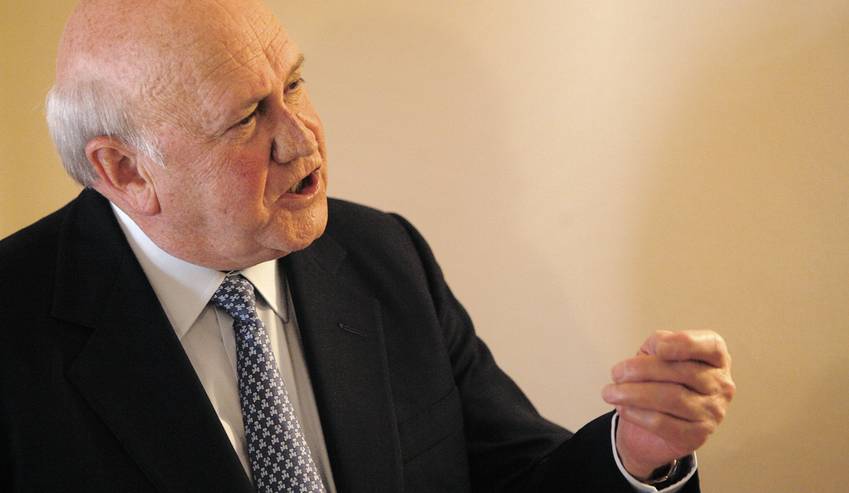Opinion by Mpumelelo Mkhabela
Who appointed the last president of a repressive state FW De Klerk to be the spokesperson of white South Africans? Do white South Africans see him as their legitimate representative?
De Klerk has a right to freedom of expression – which under the apartheid government was a matter of life and death – but he has no right to claim a false status as a representative of whites. Such conduct is disrespectful of self-respecting whites who can speak for themselves.
De Klerk was recently quoted saying if the ANC-led government continued with black economic empowerment and policies that seek to empower blacks, whites would leave the country.
“We have to face the unpalatable fact that our present government has adopted policies that are consciously directed toward harming the core interests of a section of the South African population according to their race,” De Klerk said.
Ironically, De Klerk was speaking at the launch of the “Centre for Unity in Diversity”. It boggles the mind that a centre ostensibly established to promote “unity in diversity” was launched on a bitter note that seeks to justify the apartheid wealth structure.
De Klerk’s views undermine his past leadership role in assisting the country navigate the thorny path from apartheid rule under his National Party to democracy. He was praised the world over for his contribution in the relatively peaceful transition, including releasing Nelson Mandela from prison without conditions. He would later share Nobel Peace Prize with Madiba.
Apartheid nostalgia
The award was in recognition of the part he played in leading whites towards democracy and for initiating political reforms in line with the demands of the liberation movements.
Once the new constitutional order had been established, De Klerk’s alleged exclusive right to lead whites expired. But his remarks suggest he suffers from apartheid nostalgia.
The dawn of democracy ensured freedoms not just for blacks. Whites were also freed from the political monopoly of the likes of De Klerk and his predecessors in the National Party.
Unlike in the past when they were indoctrinated with Calvinistic teachings, whites under the current constitutional dispensation are free from the burden of artificial superiority complex. The Bill of Rights, the cornerstone of our constitutional democracy, also frees blacks from apartheid-imposed inferiority complex and enables them to rightfully claim their humanity.
As an elder De Klerk should appreciate better the complex issue of nation building in the context of the “united in our diversity” promise stated in the constitution.
Alas, he seeks to retrieve whites from the nation building project and transport them back to the past where they were made to believe, incorrectly, that their interests were not linked to those of blacks.
It is disturbing that De Klerk has failed to transcend his perceived narrow interests of the people on whose behalf he claims to speak. Why is De Klerk not focusing on the poverty of black people, largely the legacy of apartheid rule under which they were denied rights to own property, for example?
If De Klerk wants to confirm the historic indispensability of blacks to white wealth from colonial period to apartheid he must read the book History of Inequality by Afrikaner academic Sampie Terreblanche. The book will help him abandon his hostile attitude towards wealth accumulation by blacks.
Sharing in the wealth of the country is necessary for forging a strong common national identity. It’s in the interest of blacks and whites. If De Klerk doubts this, he must read some speeches by Anton Rupert, the Afrikaner entrepreneur and founder of the Remrandt Group.
Inclusive solutions
In 1978, in a speech to mark the 10th anniversary of the Medical Shuttle Service he had founded in Maseru, Rupert remarked: “We are all Africans, whatever our colour or creed or persuasion, and our future depends on our mutual loyalty and support.”
With all the stresses our country faces – inept political leadership, economic hardship, racist incidents and corruption among others – one would have expected De Klerk to seek inclusive solutions.
Sadly, De Klerk is stuck in the separatist past. In itself this shouldn’t be a big issue. It is a personal choice from which it might be difficult to dissuade a former Nat.
The problem, though, arises when he imposes his views on white South Africans. Many are enjoying their country with all its ups and downs. They read in the news or hear from their domestic workers about the grinding poverty in Dieplsoot and Marikana.
The empowerment of their black compatriots cannot force them to leave the country. So loyal was Bram Fischer, the Afrikaner lawyer who fought for equal rights for all, that he resisted calls for him to go into exile when he faced persecution by the apartheid regime. The rights of all citizens are enshrined in the constitution and no one faces legally-sanctioned persecution. So why would whites leave?
It cannot be correct that white wealth must necessarily depend on the perpetuation of black poverty – a scenario which, in De Klerk’s “logic”, will keep whites happily in South Africa.
Whites must not keep quiet while De Klerk misrepresents them. They must stand up and tell him what Archbishop Desmond Tutu has told Jacob Zuma: “You don’t represent me!”.
[Source: News24]





 WhatsApp us
WhatsApp us 

